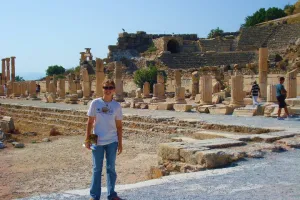
For Lindsey Alazraki, the answer to “What do you want to be when you grow up?” was cemented in the days and weeks following the 9/11 attacks. In the aftermath, Alazraki’s Maitland, Florida school created and sold flag pins, donating the proceeds to the New York City first responders.
Viewing the attacks in real time from her sixth-grade classroom, Alazraki recalls a world in shock and grief. She remembers the fervor of the mass production assembly line of pins as a way to do something constructive to help ease the pain. Making sure attacks on the homeland never happen again became a focus for her study and career aspirations.
Having an aversion to idleness, whatever she puts her mind to, Alazraki is all in. Academically, she earned a Bachelor of Arts in Political Science and a Master of Science in Defense and Strategic Studies, capped off with summer study in 2010 at Koc University in Istanbul, Turkey. Of Turkish decent, Alazraki enjoyed international relations courses as well as personally connecting with her family roots.
As a Supervisory Transportation Security Specialist in the Security Threat Assessment Division (STAD) of Intelligence and Analysis, Alazraki helps protect U.S. seaports by conducting security threat assessments on applicants for Transportation Worker Identification Credential cards.
“Assessments review criminal history, mental capacity and immigration eligibility” of workers who need access to secure areas of the nation’s maritime facilities and vessels, explained Alazraki. “We mitigate any potentially disqualifying information by doing statutory research, court record research and engaging with law enforcement agencies.”
The principles of care for our people and self-improvement are braided together in the way Alazraki works and trains others. “A leader should always be striving to improve themselves so that they can more effectively care for their people,” said Alazraki. “It means getting the job done while ensuring that your people are protected, striving towards their personal goals and improving their performance.”
What are you most proud of?
Helping people obtain a credential they need to provide for themselves and their families is what I’m proud to do. We are a bit like a second chance organization because we do our best to give people who may have made mistakes in the past the ability to work. We balance that goal with ensuring public safety as designated by our federal regulations.
What’s the most rewarding part of your job?
One of my most fulfilling duties is participating in the training of new STAD adjudicators. Answering their questions, providing feedback and watching them grow into their role as important members of the STAD team is one of my proudest achievements.
What’s the most challenging part of your job?
It is easy to get caught in a rut after initially being trained for a position. It requires an internal commitment to excellence and a desire for self-improvement to ensure a person does not become complacent in their personal or professional life.

